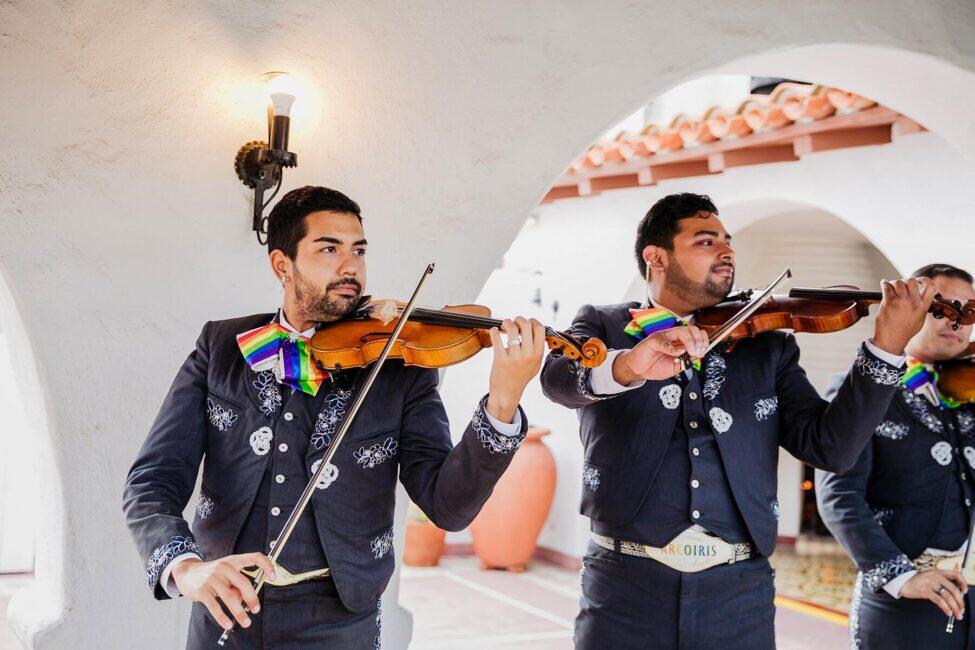Mariachi Arcoiris encompasses what it means to live harmoniously.
Originally founded in 2000, Mariachi Arcoiris de Los Angeles is recognized as the world’s first LGBTQ+ mariachi band. Arcoiris, which means “rainbow” in Spanish, is a fitting name to describe the diversity of the band’s members, including Natalia Melendez, the first transgender woman in the history of mariachi.
We recently spoke with Carlos Samaniego, the director and founder of the band, including the inspiration for forming Mariachi Arcoiris, how it’s been received within the Latino community, and their recent partnership with Estrella Jalisco on a social media campaign to bring families free performances and encourage open conversations about machismo culture, inclusivity, and identity.

How did you first get started and what inspired you to form the band?
Mariachi Arcoiris has two inception dates. The first was in the year 2000 when I was a college student and a member of the Gay and Lesbian Alliance. I was helping to organize their Pride Week, and we were planning a mock wedding because same-sex marriages were illegal back then. The mock wedding was a protest to that, and this was at California State University Los Angeles, which had a very Latino campus. The club thought that they would need a mariachi because there’s always a mariachi at any wedding.
I thought it would be creative if it was an all-gay mariachi and we ultimately created this group for a one-time performance. Flyers for this one event started circulating everywhere, all over town. And the manager of a gay Latino cowboy nightclub caught wind of it. After we were done he offered us work at his nightclub. We started performing there, but I was young and didn’t really know how to direct a group.
Recommended Fodor’s Video
After a few months it fizzled out, but it had planted the seed. I started to perform with other professional mariachi throughout Southern California and in New York and encountered certain discrimination or bullying because I was always out, and that was taboo. These things started to pile up over the years, and finally, at the end of 2013, a quick remark was the straw that broke the camel’s back.
I decided then that I needed to recreate Mariachi Arcoiris, an idea that was always in my mind throughout those years when I was going through a negative experience with some other mariachi musician because of our machismo culture, this toxic masculine culture. This time it was for much more personal reasons. I also felt like I needed to create a safe space for other queer, LGBTQ+ mariachi musicians because I knew that I couldn’t be the only one going through this.
How has the reception been within the Latino community?
It’s generally been a very good reception when we’re there physically. A recent story about us hit the Latin American market and the comments were not very good. There’s immediately this backlash about how we’re disrespecting the mariachi suit, or we’re disrespecting music or the culture, yet they haven’t even heard us.
When we perform I’m very strict with my musicians about the music part. Music was the whole reason why we even got together as a group. Having a high standard of professionalism, and high-quality music is going to be our armor. We’re not only proud to perform the music because we love performing. We’re also going to use that same music to defend ourselves against these people who say bad things. Because as soon as they hear us perform, then things change. They are able to see how we’re passionate about what we do, that we take it seriously, and that we perform well.

Could you tell me more about your partnership with Estrella Jalisco?
Estrella Jalisco reached out to me and said that they wanted to revolve this marketing campaign around Mariachi Arcoiris. They feel that we are the fusion of traditional and modern-day family. The fact that we’re the first LGBTQ mariachi, we’re the only LGBTQ mariachi in the world, brings this very modern-day thinking about new traditions into the picture. They want to tell people that whether they’re old or young, whether they’re straight or not straight, whether they’re cis, male or female or [nonbinary], that we can all come together and still live harmoniously. And they feel that Mariachi Arcoiris encompasses all of that.
How does your music distinguish itself from other bands in the same genre?
We are a mariachi band, so we perform traditional mariachi music. I don’t like changing too much and I try to respect the composer’s intention as much as I can. That has been ingrained in me as a classically-trained musician. But when it comes to pronouns and gender, we flip it around. For example, there’s a famous song by Jose Alfredo Jimenez called Ella, which in Spanish means “her” or “she.” In this case with the song, I’m not going to change the words to “El” (“him”). The whole focus of the song is around the love of a woman, so instead, I’m going to have a girl sing it.
If I’m singing about love or betrayal, I like singing straight to a guy and I choose someone from the audience. It makes it fun for the whole audience, but it also makes it very inclusive. I don’t know how many men or boys grew up with the dream that they were the one being serenaded to. And so now I get to serenade a man. Sometimes they don’t know what to do with themselves and other people eat it up, they want the attention.
I also hired an arranger and composer of mariachi music. I choose all of our repertoire and I send it to him so that he can make an original arrangement for us. I’m very selective as to what kind of repertoire we perform because I always want to make sure that we’re representing the LGBTQ+ community in some way, but that we still stay within the work.

One of the members of Mariachi Arcoiris, Natalia Melendez, is the first transgender mariachi woman in the history of mariachi. How did you two meet?
Natalia is one of my dearest friends. She was part of the original Mariachi Arcoiris de Los Angeles from the year 2000. But back then she wasn’t Natalia, this was before her transition. She was one of the first people I reached out to when I recreated the group. She’s a pioneer.
When we were younger, she told me that she was going to make a transition. I knew how important mariachi was to her, she’d been doing it since she was a little boy. We’ve known each other since we were teenagers, and so I asked her how she expected to make this transition and still play mariachi music. Back then my mentality with certain things was still not very open, I didn’t know what the possibilities were. She said she didn’t know how but she was going to do it. And then she showed me and everyone else that she could.
With Mariachi Arcoiris we’ve given her a platform to develop and grow as an artist. The group that she made her transition in was the same group that I met her in while we were teenagers. They were always very accepting of her, even when she was an openly gay man. With Mariachi Arcoiris she has developed into a very good singer and is more confident in her singing. People love her, they give her amazing applause.
What are your plans for the future?
It has been a dream and a goal of mine to go to Mexico, and we have been formally invited to perform for Mexico City Pride at the end of June. They’re not going to have a parade but we’ll perform live from the city center and the Presidential Palace. They’re going to stream and broadcast all of the performances. We also want to record another album and win a Grammy. Another dream is to open up my own dinner theater and mariachi restaurant. Here in the United States, that’s really the best way to have stability for mariachi because that offers constant work.
Through their partnership with Estrella Jalisco, Mariachi Arcoiris de Los Angeles is offering five lucky winners the chance to experience a free virtual performance by Mariachi Arcoiris. To enter, leave a comment on Estrella Jalisco’s Twitter, Facebook, or Instagram post and mention a song that you feel deserves to have a mariachi version.



